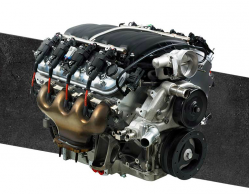
— A Chevy Corvette LS7 engine lawsuit has been filed alleging the 7.0 liter V8 engines have problems with excessive wear of the valve guides that can cause engine failure.
Named in the proposed class-action lawsuit are the 2006-2013 Chevy Corvette 427 and Chevy Corvette Z06 equipped with LS7 7.0L V8 engines.
The proposed class-action lawsuit is for all U.S. residents who purchased or leased a Chevrolet Corvette 427 or Corvette Z06 at any time from 2006 to the present and who still own or lease a vehicle, or sold a vehicle, at any time from 2006 to the present.
The lawsuit says General Motors advertised the LS7 7.0 liter V8 engine as being of the highest quality and durability while allegedly knowing the engines had problems with the valve guides.
While allegedly knowing the engines were defective, GM ignored the fact Corvette owners were always experiencing mechanical failures with engines that weren't performing as designed and advertised. Additionally, the plaintiffs say GM has taken no steps to correct or recall the Corvettes even while owners kept experiencing engine failures at a high rate.
According to the lawsuit, the 427 and Z06 engines have valve guide clearances far beyond service limits even in cars with very low mileage. Using a test specified by GM itself, many cars were found to have valve guides far out of specification on Corvettes built between 2006 and 2014.
Even after owners kept complaining, GM allegedly said the valve train noise was normal for the LS7 7.0 liter V8 engine and only occurred because of a single supplier during a short period of time. The plaintiffs claim while GM was saying this, the automaker maintained the problems weren't caused by the valve guides being out of specification.
The lawsuit alleges that due to Corvette owner complaints, GM created a technique known as the "wiggle method" to determine if the valve guides were out of specification. However, the plaintiffs claim once GM saw the test would cause repairs and investigations, the automaker stopped the test.
The engine lawsuit alleges GM and its associates concealed information about the defects from the government, the public and Corvette owners. The plaintiffs further claim the purpose for the deception was to sell more vehicles and keep from paying to repair or replace the cars. In addition, allegedly concealing the defects helped to boost GM's brand name while avoiding negative publicity due to recalls.
The Corvette engine lawsuit lists 72 claims against the automaker ranging from negligence and consumer fraud to violations of the Racketeer Influenced and Corrupt Organizations (RICO) Act.
Named as plaintiffs are William D. Pilgrim, Walter Goetzman, Jerome E. Federson, Michael F Ernandez, Roy Haleen, Howard K Opel, Robert C. Murphy, Mike Peters, Christopher Constantine, John P Arsons, Lyle Dunahoo, Aaron Clark, Edwin William Krause, David S Heldon, Jared Kiley, Jeff Kolodzi, Morris Smith and Andres Frey.
The Chevy Corvette LS7 engine lawsuit was filed in the United States District Court for the Central District of California - William D. Pilgrim et al v. General Motors Company LLC.
The plaintiffs are represented by Knapp Petersen and Clarke.




